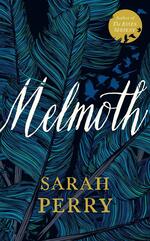
TITLE: Melmoth
AUTHOR: Sarah Perry
PUBLISHER: Serpent's Tail
ISBN: 1788160657
PODCAST EPISODE: None
REVIEWER: Tracey Norman
This is the first of Perry’s books I have read, so I went into it with no expectations or preconceptions. The blurb suggests a novel of creeping horror and apprehension, so the presentation of Melmoth surprised me. She received such a build-up that I expected a lot more than the rather impotent figure than was revealed, one more of tragedy than terror. The flashbacks through which her story are told certainly held a note of dread, but there was nothing in the actuality of Melmoth to inspire such feelings. So where did they come from?
As I read, every time Melmoth appeared, a feeling of anticipation rose in me. What would she do? What would happen to the character who was now seeing her? When, time after time, that anticipation was left unfulfilled, with Melmoth simply slipping back into the shadows, it struck me that perhaps we all have our own personal Melmoth - she becomes what each individual makes of her through their own bias, experience and flaws. Certainly Perry’s characters are flawed; that is their key characteristic. Each of them fails in a very human way and the shared dread of Melmoth seems to be their way of acknowledging the darkness within themselves whilst simultaneously distancing themselves from it, anthropomorphising it and compartmentalising it. When viewed this way, the story becomes less a slightly disappointing Gothic novel and more a dark exploration of the human psyche.
Perry’s characters are not just flawed, they are all inherently unlikeable. I was disappointed when I realised that there wasn’t going to be a single character that I could root for. I enjoyed the various different narrator voices, finding the flashbacks more compelling than the main narrative at times. Even where these narrators give the impression that they are telling the truth, there is always an indication of bias suggestive of unreliability, and I do love an unreliable narrator. Here, though, due to the unpleasant natures of all the characters, they did not offer a change of tone so much as a different way in which to see how awful humans can be to one another. The dread does not build as the story progresses, but rather ebbs and flows throughout.
Like some other readers, I did feel that the big reveal of Helen’s terrible misdemeanour was underwhelming, but held a quiet awfulness that sat well with the sickening self-indulgence of her “penance”. Yes, I found Helen particularly unlikeable, but I enjoyed the challenge of seeing past that to the exploration of guilt and betrayal that lay beneath. This is a bleak and challenging book, but fascinating nonetheless, and where the writing shines, it really does shine.
AUTHOR: Sarah Perry
PUBLISHER: Serpent's Tail
ISBN: 1788160657
PODCAST EPISODE: None
REVIEWER: Tracey Norman
This is the first of Perry’s books I have read, so I went into it with no expectations or preconceptions. The blurb suggests a novel of creeping horror and apprehension, so the presentation of Melmoth surprised me. She received such a build-up that I expected a lot more than the rather impotent figure than was revealed, one more of tragedy than terror. The flashbacks through which her story are told certainly held a note of dread, but there was nothing in the actuality of Melmoth to inspire such feelings. So where did they come from?
As I read, every time Melmoth appeared, a feeling of anticipation rose in me. What would she do? What would happen to the character who was now seeing her? When, time after time, that anticipation was left unfulfilled, with Melmoth simply slipping back into the shadows, it struck me that perhaps we all have our own personal Melmoth - she becomes what each individual makes of her through their own bias, experience and flaws. Certainly Perry’s characters are flawed; that is their key characteristic. Each of them fails in a very human way and the shared dread of Melmoth seems to be their way of acknowledging the darkness within themselves whilst simultaneously distancing themselves from it, anthropomorphising it and compartmentalising it. When viewed this way, the story becomes less a slightly disappointing Gothic novel and more a dark exploration of the human psyche.
Perry’s characters are not just flawed, they are all inherently unlikeable. I was disappointed when I realised that there wasn’t going to be a single character that I could root for. I enjoyed the various different narrator voices, finding the flashbacks more compelling than the main narrative at times. Even where these narrators give the impression that they are telling the truth, there is always an indication of bias suggestive of unreliability, and I do love an unreliable narrator. Here, though, due to the unpleasant natures of all the characters, they did not offer a change of tone so much as a different way in which to see how awful humans can be to one another. The dread does not build as the story progresses, but rather ebbs and flows throughout.
Like some other readers, I did feel that the big reveal of Helen’s terrible misdemeanour was underwhelming, but held a quiet awfulness that sat well with the sickening self-indulgence of her “penance”. Yes, I found Helen particularly unlikeable, but I enjoyed the challenge of seeing past that to the exploration of guilt and betrayal that lay beneath. This is a bleak and challenging book, but fascinating nonetheless, and where the writing shines, it really does shine.